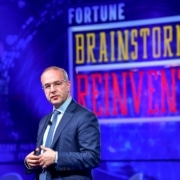Business Leaders Should Take a Stand Against China’s Human Rights Abuses

On November 2, Peng Shuai, a Chinese tennis star and former Olympian, posted a statement online accusing a former senior Chinese government official of sexually assaulting her. Chinese censors quickly removed the post and Peng disappeared from the public eye for weeks.She has since resurfaced in videos and images, but the Beijing government has restricted Peng’s ability to speak or appear publicly.
This episode, which is still unfolding, has intensified an international debate about human rights in China that is sure to escalate in anticipation of the country’s hosting of the Winter Olympic games in February. It also has revealed the fault lines between those who are willing to publicly challenge Chinese government abuses, especially relating to the crackdown on democracy in Hong Kong and the oppression of the Uyghurs in Xinjiang, and those who seek to excuse or even justify the government’s conduct in order to maintain access to China’s economic juggernaut. The Biden Administration’s bold and principled decision last week not to send U.S. officials to Beijing for the Winter Olympics is the latest chapter in this story.
Ray Dalio likened the Chinese government to “a strict parent” who demands loyalty and good behavior.
Two international sports organizations, the Women’s Tennis Association (WTA) and the International Olympic Committee (IOC), have responded to China’s attempt to suppress Shuai’s brave and unexpected effort to hold a prominent male figure in the autocratic country accountable for sexual misconduct. The responses could not have been more different. The WTA and its president and CEO, Steve Simon, demonstrated strength and courage. In early December, the WTA announced that it will cancel all tournaments in China and Hong Kong, forgoing millions of dollars of advertising and other revenue. In announcing this decision, Simon said, “If powerful people can suppress the voices of women and sweep allegations of sexual assault under the rug, then the basis on which the WTA was founded—equality for women—would suffer an immense setback.”
In stark and shameful contrast, the International Olympic Committee has bent over backward to minimize Peng’s mistreatment in an effort to mollify Chinese authorities in the run up to the upcoming games. Presumably working hand-in-glove with Chinese authorities, the IOC engineered a conversation between its president, Thomas Bach, and Peng, a carefully scripted performance that raised more questions than it answered. Despite calls from human-rights activists and governments to reveal the circumstances of the dubious exchange, or to demand that the Chinese government allow Peng to meet with independent interlocutors in an uncontrolled environment, the IOC has toed Beijing’s line, essentially treating the case as closed.
U.S. business leaders also have been missing in action when it comes to human rights in China, fearful that even modest criticism of the Beijing regime will result in their being excluded from China’s vast consumer market. In July, the Congressional Executive Commission on China, a bipartisan, bicameral body, held a hearing with representatives of six corporate sponsors of the Olympics, including Coca-Cola, Visa, and Proctor & Gamble. For two hours, company representatives struggled to reconcile their professed concern for human rights with their unwillingness to condemn what is happening in Xinjiang or Hong Kong.
Some leading business figures have gone further, openly excusing Chinese government actions in an effort to curry favor with the country’s leader, Xi Jinping. During an interview on CNBC last week, Ray Dalio, the billionaire founder and chairman of Bridgewater Associates, a well known hedge fund, likened the Chinese government to “a strict parent,” who demands loyalty and good behavior from children, in this case, the Chinese people. When asked about the disappearance of political dissidents in China, the financier said, “That is their approach; we have our approach.” In a comment that was eerily similar to former President Donald Trump’s defense of Russian President Vladimir Putin in an interview with Bill O’Reilly in 2018, Dalio asserted a false equivalence between human rights in the U.S. and China: “I look at the United States, and I say, well, what’s going on in the United States, and should I not invest in the United States” because of “our own human-rights issues, or other things?”
Subscribe to the Ethical Systems newsletter
Stung by a wave of criticism, even within his own firm, Dalio offered an awkward explanation of his dismaying remarks. “Now that things have calmed down, I want to clarify what I meant when I sloppily answered a question about China,” Dalio wrote recently on LinkedIn. “I was not expressing my own opinion or endorsing that approach. I didn’t mean to convey that human rights aren’t important … I was attempting to explain what a Chinese leader told me about how they think about governing.”
Most corporate leaders work hard to avoid any public commentary on China’s poor human-rights record, even as they continue to make huge profits by doing business there. These include, among others, prominent management consulting firms like McKinsey & Co., which has numerous contracts in China, including some with Chinese government agencies. Prominent investment firms like Silver Lake and Sequoia Capital also are generating huge profits and fees through their financial ties to Chinese technology companies.
U.S. business leaders are well aware of the Chinese government’s aggressive pushback against any criticism of its actions. The failure of these executives to acknowledge the ongoing issues underscores why it is so important for governments like the U.S. to challenge China’s poor human-rights record. Which brings us back to the Biden Administration’s decision to forgo diplomatic representation at the Beijing Olympics. Rejecting calls for a total boycott of the games, which would deny U.S. athletes the opportunity to compete, the administration rightly signaled that there can be no business as usual, given the gross human-rights abuses occurring in China. In hosting a two-day Democracy Summit last week, it led by example on China. One hopes that in the coming days U.S. officials will persuade other democratic governments to follow suit.
Michael Posner is the Jerome Kohlberg professor of ethics and finance at NYU Stern School of Business and director of the Center for Business and Human Rights. Follow him on Twitter @mikehposner.
Reprinted with permission from Forbes.







